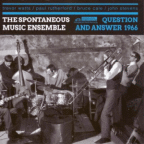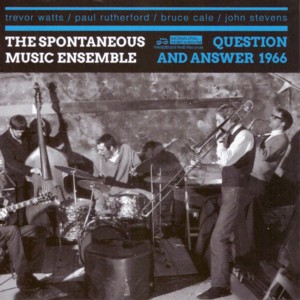Record Reviews
1 Review Found. Use search to find more reviews or follow the links in the review text.
  | SPONTANEOUS MUSIC ENSEMBLE ~ QUESTION AND ANSWER
RHYTHM AND BLUES 068 (Barcode: 5060331752431) ~ UK ~ Free Jazz / Improvised Music
Recorded: 1966 Released: 2021
This is an archival release, which presents early recordings by the pioneering British Free Jazz / Improvised Music outfit, called Spontaneous Music EnsembleFind albums by this artist (a.k.a. SMEFind albums by this artist), fronted by drummer / composer John StevensFind albums by this artist, which also includes saxophonist Trevor WattsFind albums by this artist, trombonist Paul RutherfordFind albums by this artist and Australian bassist Bruce CaleFind albums by this artist. The album presents eight tracks recorded live at a pub, as well as an Q&A session with the musicians, and additionally four trio tracks (less Rutherford), recorded a couple of months later at an unknown studio. The sound quality is a bit rough around the edges, but surely good enough to express the atmosphere and the magic of the music. The album’s booklet with text by Simon SpillettFind albums by this artist, gives a wide historic perspective of the circumstances surrounding the music.
Soon after Stevens formed the SME with Watts and Rutherford, the group begun a residency at the Little Theatre Club, and soon after recorded their debut album. The recordings on this album originate from just few months later on and are some of the earliest SME musical documents. Over the years the entire British (as well as many European improvisers) Avant-Garde Jazz scene took part in SME activities, making it one of the most formidable British / European foci of the genre. A plethora of SME lineup existed up to the untimely death of Stevens in 1994.
Britain was definitely somewhat behind the burgeoning American Avant-Garde Jazz scene, which started in the late 1950s, and therefore what was considered as Free Improvisation in UK was much gentler and less radical than what was happening across the pond. The music played here still offers some basic themes, which are then improvised on, and the music more often than not still swings, at least to those listeners who can recognize that swing in Stevens’ drumming. Watts, improvising bravely and with unlimited expressionism, is only of the verge of becoming the Master Improviser he would become a few years later. Rutherford manages to raise some brows, being perhaps the most virtuosic performer at that point of time.
Overall this is certainly a very important document as far as the British / European Avant-Garde history is concerned, and the fact that this music suddenly pops up five and half decades later is a major discographical event. Surely this will be of interest to many British Jazz fans around the globe and make many of them grateful for being able to enjoy it.
| | Updated: 19/06/2021Posted: 18/06/2021 | CD 2 Recommend To A Friend |
|







